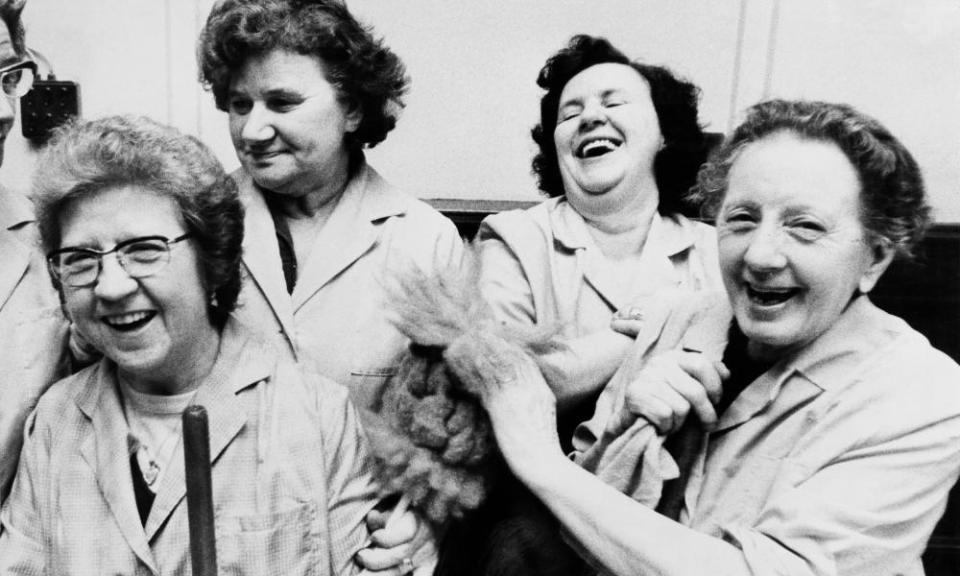We can stop to take pride on International Women's Day – but only for a moment

On the long climb, stop and catch your breath on International Women’s Day. Look back in anger – but with pride, too. Dear granddaughters, let me recount women’s lives when I started work in 1968. To you, it’s the same ancient history the suffragettes were to me.
With my first paycheck from the Observer, I tried to buy a washing machine on hire purchase, but was refused without a signature from a husband or a father. That felt symbolic, since washing machines were such liberators. The 1975 Sex Discrimination Act gave women the right to goods, credit, loans and services, but they were still often refused, just as the law is ignored now, with women still sacked for pregnancy.
You can read any society by the distribution of money and power, and women lacked both. Only 52% were in work in 1970, so the rest were men’s dependents. Married women were barred from the Foreign Office, female barristers, directors and surgeons were rarer than hens’ teeth. In work, on average women were paid half as much as men.
In 1970 I worked in a Lucas car parts factory in Birmingham, researching a book on manual labour. That year’s official employment report found that the earnings of full-time men were roughly twice the earnings of women’s, in highest- and lowest-paid jobs. The women’s strike of 1968 at Ford’s Dagenham plant strengthened the arm of Barbara Castle, the employment secretary, but she only just squeezed the Equal Pay Act through an antagonistic Labour cabinet and unions.
Look back in nostalgia at strong unions, but remember too that they treated women as weak links: because women were paid less, they feared they might undermine men’s jobs, yet unions themselves held down women’s pay. Here’s the 1970 collective agreement between Vauxhall and the unions: “a) Women will not be engaged if suitable men are available. b) Existing male employees will not be replaced by women. c) Women will only be employed on jobs specified and agreed.” Specified jobs were low-paid stitching or fiddly benchwork like mine as a switch-cable operator clamping small wires, not high-paid assembly-line jobs.
Did the Equal Pay and Sex Discrimination Acts represent liberation won? Not at all. As now, women’s work was segregated, still paid less in the five Cs (cleaning, caring, cashiering, clerical and catering), low paid and undervalued precisely because it was women’s work. Changing laws is one step, but shifting cultural norms is like cresting one tidal wave after another.
That took us by surprise: equality seemed simple, so we underestimated just how revolutionary such changes would be. This reached into the heart of every household, every relationship, deep tradition, basic beliefs – into the psyche itself and the nature of male and female.
In 1982, when Tories booed Harriet Harman’s first question to Margaret Thatcher after arriving in parliament, about the provision of childcare, they foresaw the destruction of a system that relied on women being at home. Divorce soared from the 1970s to the 1990s, mostly initiated by women, disillusioned, breaking free or escaping abuse, says the Cambridge gender historian Dr Lucy Delap. Women wouldn’t take it any more – and the mismatch continues between wedding day fantasies and unequal parenting and housework. Working mothers are caught still in a half-made revolution, with little support for equality: childcare is too expensive, bad or nonexistent, while insane expectations of perfect parenting torture mothers with needless guilt.
Until 2010, men who murdered their wives could plead “provocation”, while the “rough sex” defence has only just been struck out. Refuges close while domestic violence rises.
The women’s movement was always ripped apart in strife: on the Guardian women’s page, I was summoned to a kangaroo court of radicals demanding that true feminists abort male foetuses. The present rift over trans issues is worse, and a madness when rights are again under threat, with Liz Truss, unlikely women’s minister, absurdly denouncing women and other equality-seeking movements for following “identity politics” and “fashion” not “fact”.
According to the Fawcett Society, the facts are that during the pandemic women lost jobs or hours. As ever, childcare, home schooling and caring for the old falls on them. Women will always lag in a man-shaped economy. Until children’s centres, nurseries and wrap-around schools with breakfast and after-school clubs are a top priority, until social care is the best it can be, women will do the caring and fall behind.
Don’t imagine victories last. While there’s a welcome breaking down of destructive gender rigidities, if we relax for a minute, old ways will return, with toys for girls more revoltingly princess pink than they were in the 1980s. Are we nearly there yet? No, but we’ve come quite a way. That, at least, signals hope.
Polly Toynbee is a Guardian columnist

 Yahoo Finance
Yahoo Finance 